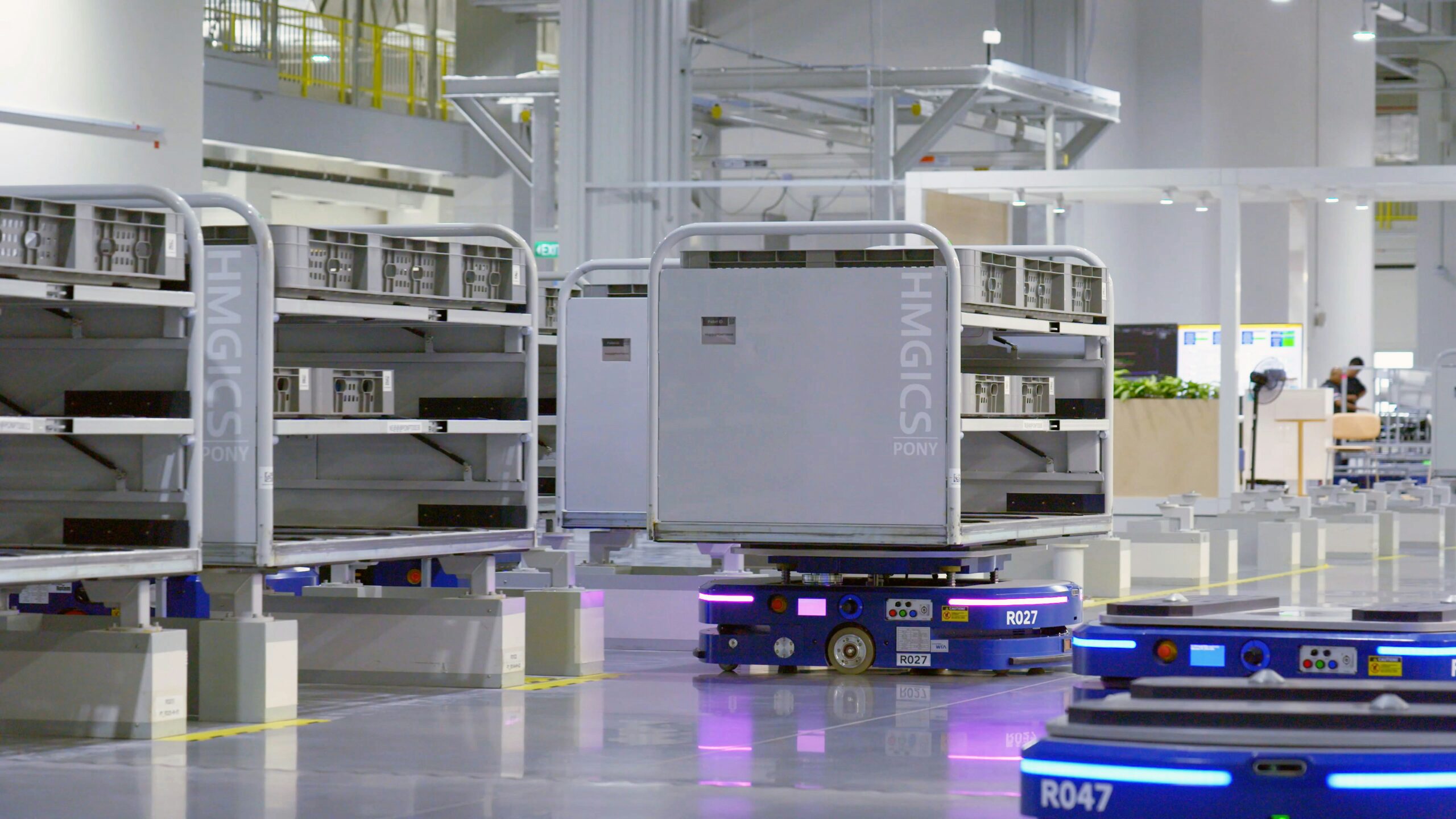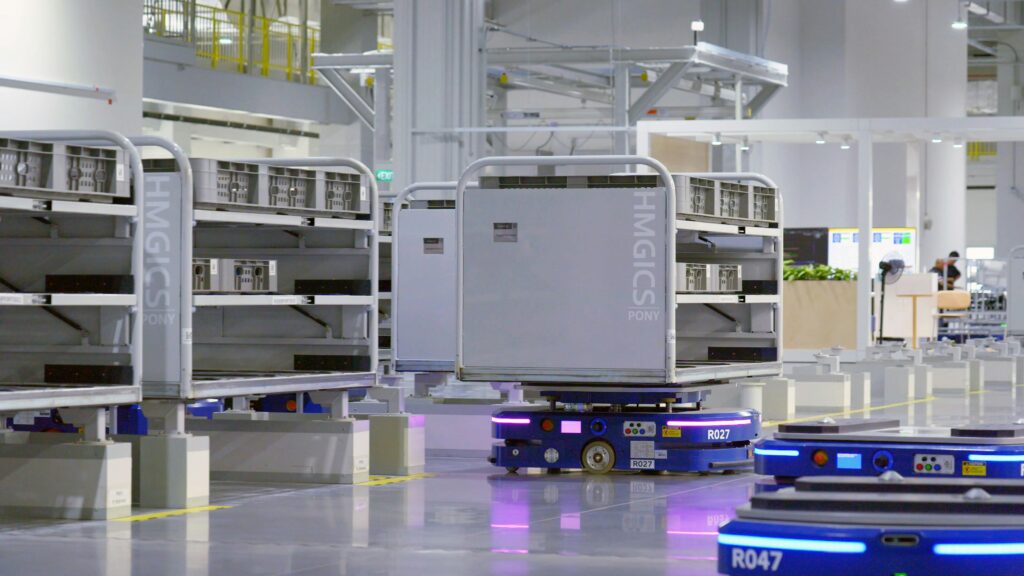
Introduction to Autonomous Factories
Autonomous factories represent a significant evolution in the manufacturing sector, marking a shift towards advanced industrial practices that rely heavily on technology. These facilities operate with minimal human intervention, utilizing a sophisticated blend of artificial intelligence (AI) and robotics to streamline production processes. The core concept behind autonomous factories is the integration of smart manufacturing techniques that enable machinery and systems to function independently while continuously optimizing operations. This advancement aims to enhance efficiency, reduce operational costs, and improve product quality.
The emergence of AI-guided autonomous factories can be attributed to the growing demand for rapid and flexible production methods capable of adapting to market fluctuations and consumer preferences. In such environments, the use of AI algorithms allows for data-driven decision-making that can predict maintenance needs, manage supply chains, and even adjust production schedules in real-time. By leveraging the capabilities of machine learning and data analytics, these factories can achieve a level of efficiency that traditional manufacturing methods struggle to match.
Moreover, the implementation of robotic systems within autonomous factories facilitates the handling of complex tasks with precision and speed, often surpassing human capabilities in repetitive or hazardous environments. As the technology continues to mature, the role of AI in guiding these autonomous systems will become increasingly central, enabling a paradigm where factories are not only automated but also intelligent. This trend signifies a movement towards smarter manufacturing, ultimately reshaping the landscape of industry and driving the next phase of economic growth.
In conclusion, the integration of AI and robotics in manufacturing through autonomous factories stands at the forefront of industrial innovation, promising to deliver improved efficiency and productivity while adapting to ever-evolving production demands.
The Role of AI in Manufacturing
Artificial intelligence (AI) has emerged as a transformative force in smart manufacturing, driving efficiencies and optimizing processes in various facets of production. One of the pivotal roles of AI within manufacturing is predictive maintenance. By utilizing AI algorithms to analyze equipment performance data, manufacturers can foresee potential failures before they occur, thereby allowing for timely maintenance interventions. This proactive approach not only enhances equipment uptime but also minimizes the risk of costly unplanned outages that can disrupt production and impact the bottom line.
Another critical function of AI is its application in quality control. Through advanced machine learning techniques, AI can identify patterns that are indicative of defects in the production process. By analyzing data from sensors and cameras installed on the assembly line, AI systems are capable of detecting anomalies in real time, which facilitates swift corrective actions. This not only improves product quality but also reduces waste and rework, reinforcing the efficiency of ai-guided autonomous factories.
Supply chain optimization is yet another domain where AI significantly impacts manufacturing. AI-driven analytics can process vast amounts of data concerning inventory levels, order patterns, and market demands to inform more effective decision-making. This ensures that resources are allocated efficiently, and response times to market fluctuations are reduced. As a result, manufacturers can maintain lean inventory levels while still meeting customer expectations. The continuous integration of AI technologies in these areas underscores its vital role in shaping the future of manufacturing, as organizations strive to achieve enhanced operational efficiency and competitiveness.
Components of an AI-Guided Autonomous Factory
The implementation of AI-guided autonomous factories marks a significant evolution in the realm of smart manufacturing. Central to this transformation are several key components that work synergistically to enhance operational efficiency and productivity.
First and foremost, robotics play a crucial role in these factories. Advanced robotic systems, equipped with sensors and artificial intelligence, can perform complex tasks with precision and speed. These robots can adapt to changes on the production line, efficiently handling variable workflows and minimizing downtime. Their capabilities extend from assembly processes to quality control, making them indispensable in the manufacturing landscape.
Alongside robotics, the Internet of Things (IoT) devices serve as the connective tissue within an AI-guided autonomous factory. These devices collect and transmit real-time data, providing insights into various operations. By monitoring equipment performance, inventory levels, and environmental conditions, IoT devices facilitate informed decision-making. This real-time data flow enables manufacturers to anticipate issues and optimize production processes, reinforcing the interconnectivity essential for smart manufacturing.
Another critical component is the machine learning algorithms that underpin many AI systems. These algorithms analyze vast amounts of data generated by the IoT devices, allowing the factory to identify patterns, predict maintenance needs, and enhance product quality. As these systems learn from historical data, they create increasingly efficient production schedules and reduce operational costs.
Lastly, AI software platforms integrate all these components into a cohesive management system. They manage workflow, monitor equipment conditions, and control robotics, thereby ensuring that every aspect of the factory operates in harmony. By leveraging data analytics and cognitive capabilities, these platforms facilitate continuous improvement and innovation within manufacturing processes.
Overall, the combination of robotics, IoT devices, machine learning algorithms, and AI software creates a robust framework that defines the future of manufacturing through AI-guided autonomous factories.
Benefits of Transitioning to Autonomous Manufacturing
The advent of AI-guided autonomous factories marks a significant transformation in the manufacturing sector. Transitioning to autonomous manufacturing offers a myriad of benefits that enhance productivity and operational efficiency. One of the key advantages is the substantial increase in productivity. Automation enables machines to operate continuously, reducing downtime associated with human shifts. This consistent operation leads to higher output levels while maintaining quality standards, essentially revolutionizing smart manufacturing processes.
Moreover, the workforce transformation associated with autonomous factories contributes to a notable reduction in labor costs. By minimizing dependency on manual labor for repetitive and hazardous tasks, organizations can redirect human resources toward areas that require critical thinking and innovation. This shift not only lowers labor expenditures but also enhances employee safety, as workers are less exposed to dangerous environments, thereby reducing workplace accidents. Enhanced safety protocols further establish autonomous manufacturing as a viable alternative for modern factories.
Furthermore, the integration of AI and automation enables a more sustainable approach to manufacturing. AI-guided systems can optimize resource allocation, from energy consumption to raw materials utilization. This optimization results in reduced waste, aligning with global sustainability goals. For instance, companies like Siemens have effectively implemented autonomous factories, achieving significant reductions in energy usage while increasing production efficiency. Such successful case studies underscore the viability of smart manufacturing and its role in supporting ecological preservation.
In conclusion, the benefits of transitioning to AI-guided autonomous factories are multifaceted, encompassing heightened productivity, cost efficiency, enhanced safety, and sustainability improvements. As industries continue to evolve, the embrace of autonomous manufacturing stands to redefine operational paradigms across the globe.
Challenges and Risks of AI-Guided Factories
The integration of AI-guided autonomous factories into the manufacturing landscape brings a plethora of prospective benefits. However, it is essential to acknowledge the significant challenges and risks that organizations may encounter during this transition. One of the most pressing issues is the high initial investment required to implement such advanced manufacturing technologies. Upgrading machinery, investing in robust AI systems, and ensuring proper integration can create a substantial financial burden, particularly for smaller enterprises with limited resources.
Another significant concern is workforce displacement. As automation increasingly takes over tasks previously performed by humans, there exists a legitimate apprehension regarding job security. Employees may find themselves rendered obsolete, leading to increased unemployment rates and potential societal unrest. To mitigate this risk, companies must adopt strategies that prioritize workforce training and reskilling, enabling employees to adapt to new roles that focus on collaboration with intelligent machines.
Cybersecurity threats also loom large as manufacturers adopt smart manufacturing practices. The interconnectivity provided by AI technologies increases vulnerability to data breaches and cyberattacks. Manufacturing facilities must implement robust cybersecurity measures and protocols to safeguard sensitive information and protect operational integrity. Failing to address these vulnerabilities could result in disruptive incidents that may compromise productivity and financial stability.
Finally, there is an ongoing need for continuous training and adaptation within organizations leveraging AI-guided innovations. The rapid pace of technological advancements necessitates that employees regularly update their skill sets and knowledge to keep pace with the evolving landscape of smart manufacturing. The lack of structured training programs may hinder effective implementation and utilization of AI-guided autonomous factories. As a result, companies must remain committed to fostering a culture of learning and adaptation to succeed in the age of intelligent manufacturing.
Real-World Applications and Success Stories
Over the past few years, numerous companies have successfully integrated AI-guided autonomous factories into their operations, yielding significant improvements in efficiency and productivity. One notable example is Tesla, which has embraced smart manufacturing technologies to streamline its production processes. The company’s Gigafactory leverages AI to optimize supply chain management, automate assembly lines, and enhance quality control. This commitment to innovation has enabled Tesla to scale production rapidly while maintaining high standards of vehicle quality.
Another significant case is Siemens, a leader in manufacturing automation, which has adopted AI-driven autonomous systems to transform its operations. The company’s amassing of data and analysis enables predictive maintenance, reducing downtime and minimizing disruptions. With AI at its core, Siemens has demonstrated that smart manufacturing can drastically improve operational efficiency and drive substantial cost savings. Their deployment of these advanced technologies has also allowed for better resource management, leading to an increase in overall sustainability.
Boeing is also at the forefront of employing AI-guided autonomous factories. The aerospace giant utilizes machine learning algorithms to analyze production data and refine aircraft assembly processes. By implementing intelligent automation, Boeing has managed to enhance production accuracy while significantly reducing production time. Furthermore, the use of AI has paved the way for real-time problem-solving, enabling quicker responses to manufacturing challenges and ultimately elevating the company’s competitive edge.
In each of these cases, the integration of AI-guided autonomous systems has sparked a transformation within traditional manufacturing setups. Increased automation not only boosts efficiency but also empowers workers to focus on higher-value tasks, fostering a culture of innovation. As more companies adopt smart manufacturing practices, the impact of these technologies is expected to grow, setting the stage for further advancements in industrial processes.
The Future of AI in Manufacturing
The manufacturing sector is undergoing a profound transformation, owing primarily to advancements in artificial intelligence (AI) and automation technologies. As we look to the future, the emergence of AI-guided autonomous factories represents a pivotal shift designed to foster enhanced efficiency, productivity, and precision in manufacturing processes. One of the most significant trends shaping this evolution is the continued advancement of machine learning algorithms, which allow systems to learn from data and improve their performance over time. This capability will enable smarter manufacturing processes, reducing the likelihood of errors and optimizing operations across the supply chain.
Moreover, the integration of AI in manufacturing raises important ethical considerations. As companies deploy AI-guided autonomous factories, they must address potential biases within algorithms and the implications of job displacement. Ensuring a fair balance between automation and human labor will be essential as organizations strive to adopt smart manufacturing practices while maintaining ethical standards. Companies must actively engage in creating frameworks that promote transparency and accountability in AI systems, particularly as these technologies become more autonomous.
Looking ahead, we can expect the capabilities of AI-guided autonomous factories to expand significantly. Envisioned advancements include real-time monitoring systems capable of predictive maintenance, which will enable machines to anticipate failures before they occur. Additionally, the incorporation of Internet of Things (IoT) technologies will facilitate seamless communication between machines and human operators, fostering collaborative environments that enhance production efficiency. These developments promise more agile manufacturing processes that can swiftly adapt to fluctuating market demands while minimizing waste and energy consumption.
In conclusion, the future of AI in manufacturing is poised to reshape the industry landscape through advanced machine learning, ethically driven implementation, and innovative technologies. As we embrace these changes, both manufacturers and stakeholders will need to adapt to the evolving standards of smart manufacturing while leveraging the transformative power of AI-guided autonomous factories.
Regulatory and Ethical Considerations
The introduction of AI-guided autonomous factories into the manufacturing sector heralds a transformative shift, yet this evolution is accompanied by several regulatory and ethical challenges that require careful consideration. As organizations integrate smart manufacturing systems that leverage real-time data processing and machine learning, questions surrounding data privacy emerge prominently. The vast amounts of data collected from sensors and production lines need stringent protection to ensure compliance with local and international regulations, such as the General Data Protection Regulation (GDPR). Manufacturers must navigate these legal landscapes while safeguarding personal and organizational data against potential breaches.
Moreover, the impact of automation on worker rights cannot be overlooked. As AI systems take on more decision-making roles, the workforce is at risk of displacement, raising moral dilemmas about employee retraining and job security. It is imperative for manufacturers to implement equitable transition plans that consider the welfare of their workers and foster a culture of continuous learning. This approach will not only mitigate resistance to technological advancements but also promote a sustainable workforce capable of adapting to new roles created by smart manufacturing processes.
Furthermore, the implications of autonomous decision-making in supply chains highlight the need for transparency and accountability. Decisions made by AI systems, if unmonitored, might lead to unintended consequences, such as biases in production planning or unfair resource allocation. By establishing clear guidelines and oversight mechanisms, manufacturers can ensure ethical governance of AI technologies. Collaboration with regulatory bodies will be crucial in shaping practices that prioritize ethical standards while promoting efficiency in AI-guided autonomous factories. Addressing these regulatory and ethical considerations will help build trust and facilitate the broader acceptance of AI within the manufacturing landscape.
Conclusion and Call to Action
The future of manufacturing is being shaped by the advent of AI-guided autonomous factories, which are revolutionizing the way industries operate. Throughout this discussion, we have highlighted the transformative potential of integrating smart manufacturing technologies. By enhancing efficiency, reducing human error, and enabling real-time data analysis, these advanced systems are poised to redefine operational standards across various sectors.
As industries face increasing pressure to remain competitive, the adoption of AI-guided solutions becomes imperative. We have seen how these factories not only streamline production processes but also provide valuable insights into performance metrics, leading to informed decision-making. The gradual shift towards automation and connectivity in manufacturing creates opportunities for organizations to innovate and optimize their operations, ensuring they stay ahead in a constantly evolving marketplace.
Moreover, embracing these technological advancements is not solely about keeping pace with competitors; it is also about fostering a proactive approach to business strategy. Companies that invest in smart manufacturing solutions are more likely to discover new revenue streams and enhance customer satisfaction through tailored products and services. This strategic outlook will serve as a strong foundation for sustainable growth and industry leadership in the years to come.
With this in mind, we urge business leaders and stakeholders to explore how the integration of AI-guided autonomous factories can benefit their operations. Assessing the specific needs and challenges of your organization will pave the way for a successful transition into a more automated future. It is essential to remain adaptable and willing to evolve, as the manufacturing landscape continues to progress. By prioritizing innovation and leveraging smart manufacturing technologies, your organization can secure a competitive edge in the market, positioning itself for long-term success.
Name: Mohit Anand
Phone Number: +91-9835131568(Sumit Singh)
Email ID: teamemancipation@gmail.com
Our Platforms:
Follow Us on Social Media:
Internal Links
Neural Interfaces: Bridging Minds and Machines
Deep Learning: Revolutionizing AI and Data Science
Mastering Computer Software Repair: A Complete Guide
Artificial Intelligence: The Intelligent Future
The Willow Chip: Revolutionizing the Future of Quantum Computing



